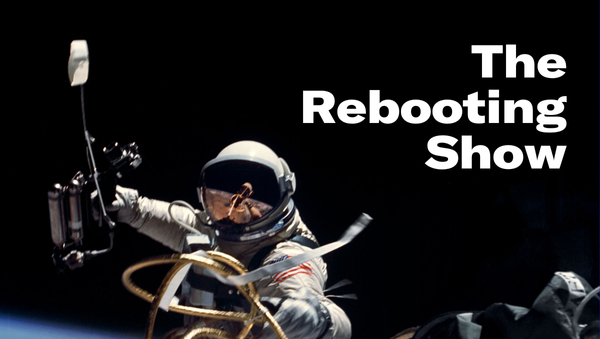Digital ad disarray
Plus: PvA on the next internet
Thanks to everyone who joined The Rebooting’s membership program. Sign up for access to all content, regular community events like live podcasts and expert workshops and more.
In today’s newsletter:
- The chaotic end to the cookie won’t end the world
- The New York Times navigates the institutional-individual shift
- Tough choices and leadership
- On PvA: The new internet and the age of empires

Publishers, this is for you

EX.CO’s new vertical video player for publishers has a first-of-its-kind, interactive, and intuitive UX, inspired by the video experience on social platforms that audiences know and love. It’s a fully optimized vertical player, built for the open web - both mobile and desktop consumption. Showing comparable performance to EX.CO’s horizontal player from a monetization perspective, the new vertical player delivers 17% more video engagement than traditional horizontal players, on average and includes familiar swiping gesture controls so users can easily navigate between videos.
Digital advertising is in disarray
Back in early 2020, I asked our creative director to make a cartoon of a cookie being crucified, because its days were numbered. The end is apparently here for the third-party cookie as Google follows Apple in blocking the third-party cookie's use in advertising.
The privacy train has left the station but nobody knows where it is going or seemingly who is driving it. Google’s Privacy Sandbox was supposed to be a big part of the solution – Google, unlike Apple, has a vested interest – only to have the IAB Tech Lab issue a “gap analysis” that basically calls it a PoS. Google hit back at the “many inaccuracies” in the IAB report. When the IAB is fighting with its biggest funder, you know this is a mess. Meanwhile, Chrome keeps deprecating cookies. Like freedom, privacy is messy.
My working assumption is that the sky will not fall. I have met too many self-interested Chicken Littles over the years to believe that. The “mortal threats” have fancied from click fraud, adware, ad networks, ad blocking, GDPR, AI, even for a brief moment in time the elimination of Flash.
Usually those predicting doom are looking for leverage or selling something. Just listen to the All-in podcast, and you’ll catch on. For all the crying about any privacy regulations, Meta figured it out just fine. Ad revenue was up 24% in the fourth quarter, thanks to using AI to do the work rather than rely on cookies.
Dotdash Meredith reported a surprisingly frisky quarter. IAC boss Barry Diller highlighted the success Dotdash Meredith has seen by replacing cookie-based targeting with its in-house solution, D/Cipher, which uses the intent data Dotdash Meredith scoops up on users to do a similar job. (Still looming is the impact generative AI search will have on the heavily SEO-dependent properties in the Dotdash Meredith portfolio, although for now, the company reported Q4 traffic gains to its “core” properties of 10%.)
Sounds like content could just be a valuable signal after all these years in which very smart technical people have used a baffling array of acronyms to convince the world that audience targeting was all that matters. The Trade Desk is working on a revolutionary product that Adweek touts as “a new interface for buyers that lets them target users across around 500 premium publishers, including The New York Times, Disney+, Hulu, Spotify, ABC and The Wall Street Journal.” Sounds a lot like an ad network.
Meanwhile, OpenAI is adding “memory” to ChatGPT. The new personalization feature will log details about a user to provide better answers over time. "Imagine the advertising opportunities," a reader wrote. Sounds a lot like the job the cookie was Shanghaied into, only the difference is Memory is opt-in. Plus ca change etc.
A new voice for the Times
Legacy brands will struggle with the shift from institutions to individuals. The New York Times is an exception on most fronts, but not on this one. Email newsletters are painted as the new homepage, but treating them as a link dump is a disservice. The Times has put out a very good newsletter product in The Morning since putting David Leonhardt in charge back in 2020, at a time when Substack was seen as some kind of threat.
Leonhardt has adopted a conversational tone and point of view, admirably pushing against various progressive shibboleths. That’s led to a few stories with anonymous internal snipings, including this from Vanity Fair. Why should his voice be the voice of The Times?
The reality is the newsletter as homepage is too neat. The homepage itself was an imperfect successor to the front page. I once went to an NYT front-page meeting, standing around silently as editors determined the next day’s news agenda. That went away with the internet. The homepage couldn’t hold such power – the Times itself used to outsource its entire web operation to a separate unit that was constructed by people thought more akin to “webmasters” than editors – and it waned to the point where some news operations abandoned it altogether. Even the NYT now is just one node – albeit a large one – in the Information Space.
The classic stentorian tone of the Times is an obvious anachronism as outdated as its bizarre headline conventions. Vanity Fair uses the word “host” to describe Leonhardt’s role. I think that’s apt. Leonhardt weaves in reader feedback, leans heavily on an analytical approach that puts news events in a broader context. I’ve compared the skills to being a moderator.
The Times clearly sees this shift, since it is adding a media reporter to cover “the array of non-traditional media organizations – including those behind newsletters, podcasts and new video formats – that are growing in popularity and influence.”
The tough stuff
The old joke in Washington is that a gaffe is when a politician accidentally tells the truth. Axios CEO Jim VandeHei has one in the wake of the messy end to The Messenger, where journalists without severance have turned to a GoFundMe, and the responsibilities that come with leadership:
“How in the hell do you live in Palm Beach and own a mansion in the Hamptons and say you can’t pay severance and healthcare for people who risked their careers for you?” This is why people hate the rich. We all make tough business decisions with unfortunate human consequences. That’s the tough stuff of ownership. How you handle those shit moments defines you. I will gladly rescind my comments and applaud Jimmy if he does right by the people he made promises to, many in writing, to provide severance and healthcare. Hiding behind his LLC might be legal, but it’s lame.”
The next internet
The media business is entering an age of empires. I don’t see AI right now as a new era of digital media. It’s more the continuation of the platforms era, solidifying and expanding the control by the largest tech companies. The numbers become so ludicrous that Sam Altman raising $7 trillion is treated as plausible.
The question becomes where to go in the age of empires. On this week’s episode of People vs Algorithms, we discussed the paths ahead because media isn’t dying, although some will perish along the way. The most exposed are those with the least control of their distribution and monetization, and whose value predominantly derives from repackaging commodity content for what Troy artfully describes as the “algorithmic feeding tube.”
I’m partial to Alex’s view that media businesses in the age of empires need to find a competitive advantage of some kind on their own terms, whether that’s unique IP, expertise and the ability to contextualize that in a broader context, and anti-algorithmic personality.
Check out the full conversation, which also covers the NFL’s media dominance, the tech-gaming-entertainment vortex, and I try so far unsuccessfully to sell Troy a membership in The Rebooting. He’ll cave.
Listen on Apple | Spotify | Elsewhere
Thanks for reading. Send me your feedback at bmorrissey@therebooting.com – and sign up for a TRB membership.




